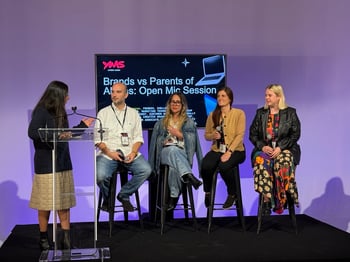 Last week, I had the opportunity to participate in the “Understanding Alphas: Brands vs Parents Open Mic Session” at Youth Marketing Strategy (YMS) New York. The panel brought together marketers and parents to explore how Gen Alpha is changing the rules of brand engagement and family decision-making.
Last week, I had the opportunity to participate in the “Understanding Alphas: Brands vs Parents Open Mic Session” at Youth Marketing Strategy (YMS) New York. The panel brought together marketers and parents to explore how Gen Alpha is changing the rules of brand engagement and family decision-making.
We discussed how this generation, born roughly between 2010 and 2025, is already influencing purchasing behavior, digital culture, and how brands communicate. As both marketers and parents, many of us on the panel reflected on how brands can earn trust and relevance in the lives of Gen Alpha families, while navigating modern challenges like screen time, education, values, and digital identity.
Here are four learnings from Youth Marketing Strategy New York:
1. Gen Z and Gen Alpha Are Redefining Brand Engagement
Gen Z and Gen Alpha are reshaping how brands connect with audiences. Both generations are digitally native and socially conscious, and they crave authenticity in every interaction. Gen Alpha, in particular, is shaping their identity through online personas and immersive digital experiences. Their biggest passion points include music, gaming, and social impact, which are all critical spaces for brands looking to build genuine connections.
To truly connect with these younger audiences, brands need to think beyond surface-level engagement. Gen Z and Gen Alpha value experiences that reflect who they are and what they stand for. They do not just consume culture; they create and remix it every day. From viral TikTok trends to collaborative gaming worlds, these audiences expect to be part of the story. Brands that invite them to co-create or express themselves authentically are the ones that will earn lasting loyalty.
2. Brands Are Embracing Immersive Technology
 I was inspired by how brands like YouTube, Chick-Fil-A, Spotify, and Nike are experimenting with new technology to engage younger audiences. From AI to avatars and virtual worlds, these companies are creating experiences that go beyond marketing to form real emotional bonds. Immersive, tech-driven engagement is no longer a nice-to-have; it is becoming a core part of how youth brands build loyalty.
I was inspired by how brands like YouTube, Chick-Fil-A, Spotify, and Nike are experimenting with new technology to engage younger audiences. From AI to avatars and virtual worlds, these companies are creating experiences that go beyond marketing to form real emotional bonds. Immersive, tech-driven engagement is no longer a nice-to-have; it is becoming a core part of how youth brands build loyalty.
As digital environments continue to expand, technology is shaping how young consumers experience the world around them. For Gen Alpha, virtual spaces are not separate from real life but an extension of it. Brands that use innovation to create meaningful and interactive experiences will stand out in a crowded landscape. The key is to focus on connection rather than novelty, using technology to enhance storytelling, spark curiosity, and build trust in ways that feel authentic and human.
3. Values Drive Purchasing Decisions
For Gen Alpha, values play a huge role in what they buy and who they buy from. They trust peer recommendations, creators, and digital communities more than traditional advertising. I found it especially interesting how subscriptions and creator-led commerce are becoming the norm, as these models offer both convenience and a sense of belonging. This generation is growing up with commerce that feels personal and participatory.
More than any generation before them, Gen Alpha expects brands to take a stand and demonstrate purpose through action. They are learning from their parents and older siblings to look for brands that align with their beliefs and contribute to positive change. Whether it is sustainability, inclusivity, or social impact, authenticity matters. Brands that communicate their values clearly and consistently are better positioned to earn the trust and advocacy of this emerging generation of consumers.
4. Agility Is Essential for Brands
 The pace of change across platforms and culture is faster than ever. What works today may not work next year. To stay relevant, brands must be agile, culturally aware, and willing to experiment. Gen Alpha moves quickly, and the brands that can evolve with them will be the ones that earn lasting trust and attention.
The pace of change across platforms and culture is faster than ever. What works today may not work next year. To stay relevant, brands must be agile, culturally aware, and willing to experiment. Gen Alpha moves quickly, and the brands that can evolve with them will be the ones that earn lasting trust and attention.
Agility is not just about reacting to trends but about anticipating what is next. Brands that invest in understanding emerging behaviors, testing new formats, and learning from real-time feedback will be better equipped to adapt. Staying close to cultural shifts, creator communities, and new technologies allows marketers to make informed decisions and remain relevant in an environment that never stands still.
Closing Thoughts
Participating in this event reinforced how important it is for brands to listen, adapt, and innovate with intention. Gen Alpha may still be young, but their expectations are already shaping the future of marketing. They value purpose, creativity, and experiences that reflect who they are and what they care about.
At Behaviorally, our work centers on helping brands understand and influence consumer behavior in this rapidly evolving environment. As new generations like Gen Alpha come of age, we continue to explore the insights and strategies that help our clients connect meaningfully across every moment of the consumer journey.
Want to learn how AI and behavioral insights can accelerate your innovation and deliver faster, more impactful results? Get in touch with us today!
THE AUTHOR
 Ethel Klein is a Vice President of Client Success at Behaviorally, headquartered in New Jersey, where she finds joy in assisting her clients in intricately defining and diagnosing consumer behavior. When not in the office, she spends her time with friends and family, her two adorable (Gen-Alpha!) children, and further her extremely spoiled rescue dogs, Bishop and Jonas.
Ethel Klein is a Vice President of Client Success at Behaviorally, headquartered in New Jersey, where she finds joy in assisting her clients in intricately defining and diagnosing consumer behavior. When not in the office, she spends her time with friends and family, her two adorable (Gen-Alpha!) children, and further her extremely spoiled rescue dogs, Bishop and Jonas.
